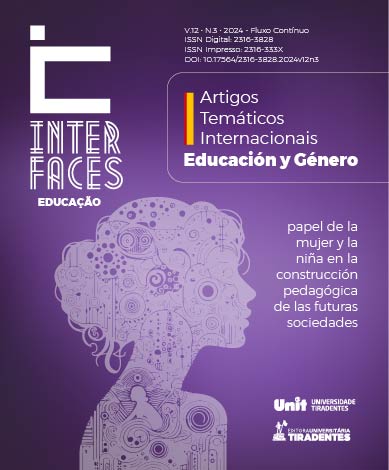EXTRACURRICULAR REINFORCEMENT IN ELEMENTARY SCHOOL: REPORTS FROM EXPERIENCES IN RURAL AREAS IN MAMANGUAPE-PB
DOI:
https://doi.org/10.17564/2316-3828.2025v13n1p103-116Published
Downloads
Downloads
Issue
Section
License
Copyright (c) 2025 Interfaces Científicas - Educação

This work is licensed under a Creative Commons Attribution-NonCommercial 4.0 International License.
A Revista oferece acesso livre e imediato ao seu conteúdo, seguindo o princípio de que disponibilizar gratuitamente o conhecimento científico contribui para a democratização do saber. Assume-se que, ao submeter um artigo, o(a) autor(a) se reconhece como detentor(a) do direito autoral sobre ele e autoriza seu livre uso pelos leitores, podendo ser, além de lido, baixado, copiado, distribuído e impresso.Abstract
Education aimed at rural subjects is not always supported by particularities and, in this sense, from the recognition of the knowledge of the rural world. It is disregarded that an adequate quality educational service, in, of and for the subjects should be aimed at a meaningful formation of the peasant people. With this essay, we seek to present reflections linked to some of the activities developed during an application that was part of a research developed by a master’s student of a Graduate Program in Education at a university, located in the northeast of Brazil. It was based on the defense of an education that considers it essential that students learn significant knowledge so that they can actively contribute to the sustainable development of the worlds they are part of. The theoretical contributions, we list Costa, Molina, Albuquerque, Rangel and Carmo, among others. To this end, a qualitative investigation was developed, with a research application. The results point out how significant it can be to consider aspects linked to the context, considering the reality of which the student is a part, including in extracurricular reinforcement, enabling the active participation of subjects from the rural world.
How to Cite
References
ALBUQUERQUE, Anaquel Gonçalves. A importância da contextualização na prática pedagógica. Research, Society and Development, v. 8, no. 11, 2019 Available at: https://www.redalyc.org/journal/5606/560662202048/560662202048.pdf. Accessed on: jan. 9. 2024.
BRAZIL. Ministry of Education General National Curriculum Guidelines for Basic Education. Secretariat of Basic Education. Brasília: MEC/SEB, DICEI, 2013.
BRAZIL. Law No. 9,394, of December 20, 1996. Law Guidelines and Bases of National Education. Brasília, DF, Dec. 1996. Available at: https://www.planalto.gov.br/ccivil_03/leis/l9394.htm
Accessed on: jan. 9. 2024.
COSTA, Lucinete Gadelha. Rural education: reflections on the curriculum. In: SILVA, Ana Claúdia Rodrigues; SILVA, Eduardo Jorge Lopes da (org.). Educação do Campo e inclusão. João Pessoa: UFPB, 2018. p. 137-151.
ESOPO. The city mouse and the country mouse. Adapted by Sílvia Moral. Available at: https://online.fliphtml5.com/uwvpx/rgci/#p=1. Accessed on: nov. 12, 2023.
KATO, D. S.; KAWASAKI, C. S. As concepções de contextualização do ensino em documentos curriculares oficiais e de professores de ciências. Ciência & Educação, v. 17, n. 1, p. 35-50, 2011.
LIBÂNEO, José Carlos. Didactics. 2nd ed. São Paulo: Cortez, 2013
LOBATO, A. Contextualização: um conceito em debate. Revista da Educação Pública. 2008. Available at: http://www.educacaopublica.rj.gov.br. Accessed on: jul. 23, 2024.
MELO, Maria Aparecida Vieira de. A contextualização do ensino: realidade de algumas escolas do campo de Canhotinho-PE. Diversitas Journal, v. 3, n. 1, p. 102-115, 2018. DOI: 10.17648/diversitas-journal-v3i1.543. Available at: https://www.diversitasjournal.com.br/diversitas_journal/article/view/543. Accessed on: jul. 18, 2024.
MINAYO, Maria Cecília de Souza (org.). Pesquisa social: teoria, método e criatividade. 18 ed. Petrópolis: Vozes, 2001.
MOLINA, Mônica Castagna; MONTENEGRO, João Lopes A.; OLIVEIRA, Liliane Lúcia N. A. Das desigualdades aos direitos: a exigência de políticas afirmativas para a promoção da equidade educacional no campo. Raízes, Campina Grande, v. 28, n. 1-2 and v. 29, n. 1, p. 174-190, jan./2009 to jun./2010.
PLOMP, T.; NIEVEEN, N.; NONATO, N.; MATTA, A. (ed.). Pesquisa-aplicação em
educação: uma introdução. São Paulo: Educational Crafts, 2017. 2018.
RANGEL, Mary; CARMO, Rosângela Branca do. Da educação rural à educação do campo: revisão crítica. Revista da FAAEBA: Educação e Contemporaneidade. Salvador, v. 20, n. 36, p. 205-214, dec. 2011. Available at: http://educa.fcc.org.br/scielo.php?script=sci_arttext&pid=S0104-70432011000200018&lng=en&nrm=iso. Accessed on: jul. 10, 2024.
RODRIGUES, Adriege Matias; RODRIGUES, Ana Cláudia da Silva. Concepções sobre educação do campo que permeiam o fazer pedagógico em uma instituição educativa que forma professores. In: RODRIGUES, Ana Cláudia da Silva; SILVA, Eduardo Jorge Lopes da (org.). Educação do Campo e inclusão social. João Pessoa: UFPB, 2018. p. 49-69.
TEIXEIRA, P. M. M; MEGID NETO, J. Uma proposta de tipologia para pesquisas de
natureza interventiva. Ciênc. educ., Bauru, v. 23, n. 4, p. 1055-1076, dec. 2017. Available at: http://dx.doi.org/10.1590/1516-731320170040013. Accessed on: jun. 10, 2022.
VAL, Maria da Graça Costa. What is it to be alphabetized and literate? In: CARVALHO, Maria Angélica Freire de; MENDONÇA, Rosa Helena (org.). Reading and writing practices. Brasília: Ministério da Educação, 2006. p.18-23.


















